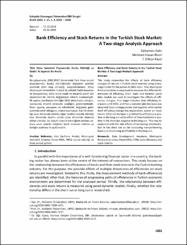Bank Efficiency and Stock Returns in the Turkish Stock Market: A Two-stage Analysis Approach
Özet
This study researches the effects of bank efficiency changes of returns in Turkish stock markets using a two-stage model for the period of 2002-2017. First, Malmquist Productive Index is employed to measure the different dimensions of efficiency; then, static and dynamic panel data models are used to investigate the effects of efficiency changes. First stage indicates that efficiency increased until 2010, and then a considerable decrease was observed. Second stage proves that together with market itself efficiency change has explanatory power on stock return. Effect of increase in profitability efficiency is positive in the long run while effect of intermediation is positive in the short but negative in the long run. This may be explained with the side effects of increasing intermediation in the short run as the increasing non-performing loans and decreasing profitability in the long run. Bu çalışmada, 2002-2017 döneminde Türk hisse senedi piyasalarında, banka etkinliğindeki değişimin getiriler üzerinde etkili olup olmadığı, araştırılmaktadır. Önce Malmquist Verimlilik Endeksi ile etkinlik farklı boyutları ile hesaplanmış; daha sonra statik ve dinamik panel veri yöntemleri ile etkinlik değişiminin etkileri incelenmiştir. İlk aşama, banklarda etkinliğin 2010 yılına kadar art-tığını, sonrasında önemli derecede azaldığını göstermektedir. İkinci aşama, piyasanın ve etkinlikteki değişimin getiri üzerinde etkili olduğunu ortaya koymuştur. Karlılık etkinliği uzun dönemde olumlu; diğer taraftan aracılık etkinliği kısa dönemde olumlu ancak uzun dönemde olumsuz etkiye sahiptir. Bu durum aracılık etkinliğinin artması sonucu uzun vadede tak-ipteki kredi oranının artması ve karlılığın azalması ile açıklanabilir.
Cilt
15Sayı
3Bağlantı
https://hdl.handle.net/11363/2407Koleksiyonlar
Aşağıdaki lisans dosyası bu öğe ile ilişkilidir:


















